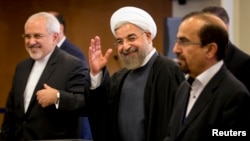Iranian President Hassan Rouhani goes before the United Nations General Assembly for an address Thursday that will likely focus on the threat of Islamic State militants and the ongoing negotiations over his country's nuclear program.
Rouhani has been critical of the U.S.-led campaign against the Islamic State group that began with airstrikes in Iraq last month, saying a military approach is not the way to stop the militants.
He said Wednesday the group grew out of the U.S. military operations in Iraq and Afghanistan.
"These groups did not exist prior to the attack on Iraq in 2003 and in all probability without such attacks and invasions perhaps they would have never come into creation," said Rouhani.
Rouhani also held a historic meeting Wednesday with British Prime Minister David Cameron in New York. It was the first time leaders from the two nations held talks since 1979.
Nuclear concessions
Cameron said Iran could help defeat the Islamic State group.
Iran and six world powers: the U.S., Britain, France, Russia, China and Germany , have been holding talks about what concessions Tehran must make on its nuclear program in exchange for a continued reduction in sanctions.
Iran has said it is committed to reaching a nuclear deal, but analysts say the chances for a breakthrough are slim ahead of the November 24 deadline that was set after the two sides failed to reach a deal by an earlier July target date.
The two sides reached an interim deal last year to reduce U.S. sanctions in exchange for Iran freezing its uranium enrichment program.
Iran is pushing to preserve its ability to enrich uranium, which it says is to be used to generate electricity. The U.S. and many of its allies fear Iran is trying to become capable of producing a nuclear bomb.





